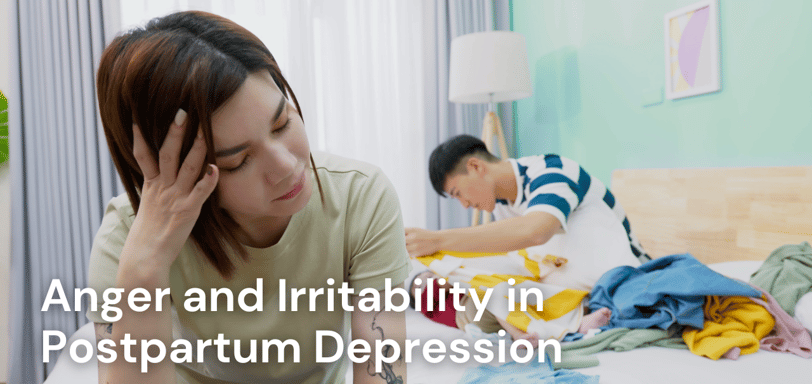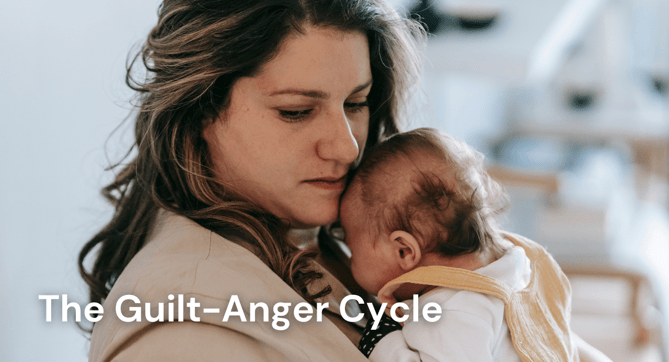Anger and Irritability in Postpartum Depression
7/1/20255 min read


When most people think of postpartum depression (PPD), they picture sadness, crying, or emotional withdrawal. While these symptoms are certainly common, there’s another, often overlooked side of PPD that many mothers struggle with silently: anger and irritability.
These emotions can be surprising, even frightening. They clash with society’s image of the soft, nurturing mother and leave many women wondering, “What’s wrong with me?” The truth is, nothing is wrong—you are not broken or failing. Anger is a valid, biological, and emotional symptom of postpartum depression.
At Peace Temple, we often support mothers who are blindsided by the rage they feel during early motherhood. Recognizing and validating this side of PPD is essential for healing and for breaking the stigma around maternal mental health.
Why Don’t We Talk About Anger?
Anger in mothers is taboo. It doesn’t fit our culture’s narrative of selfless, ever-patient caregiving. As a result, women who feel it—especially in the context of new motherhood—often internalize deep shame.
Instead of asking for help, they suffer in silence. Or they mask the rage with withdrawal, tears, or numbness—emotions that feel more "acceptable" within the mental health conversation.
But anger is more than just a symptom. It’s a signal—of unmet needs, unrelenting pressure, hormonal turbulence, or emotional burnout.
How Anger Manifests in PPD
Postpartum anger doesn’t always look explosive. Sometimes it’s subtle—tight jaws, simmering resentment, frequent snapping. Other times, it’s loud and immediate, showing up as:
Outbursts over small things (e.g., a misplaced item or a partner’s tone)
Frustration during feeding, soothing, or sleep routines
Shouting, crying, or slamming doors
Feeling irritated by the baby’s crying—even when you know it’s not their fault
Constant tension in the body—shoulders raised, stomach clenched
Intrusive thoughts or guilt about being “mean” or “out of control”
For many mothers at Peace Temple, the hardest part isn't the anger itself—it's the guilt that follows. They worry they’re traumatizing their child, harming their relationship, or proving they’re not cut out for motherhood.
But feeling rage doesn’t make you a bad parent. It makes you human—and possibly, a mother in need of more support than you’re getting.
Biological and Emotional Roots of Postpartum Rage
1. Hormonal Fluctuations
After birth, Estrogen and progesterone levels drop dramatically, while cortisol (the stress hormone) remains elevated. These hormonal shifts affect emotional regulation—making it harder to stay calm, especially under stress.
Oxytocin, the hormone linked to bonding and emotional warmth, may also dip during periods of exhaustion or difficulty breastfeeding, which can fuel emotional detachment or agitation.
2. Sleep Deprivation
Sleep is not a luxury—it’s a biological necessity. New mothers often go weeks without deep, restorative rest, making it difficult for the brain to manage emotional reactivity. The prefrontal cortex (responsible for impulse control and empathy) gets foggy, while the amygdala (the brain’s fear center) goes into overdrive.
This makes every cry, spill, or interruption feel like a full-blown crisis.
3. Emotional Overload
New mothers juggle a nonstop flood of demands: feeding, soothing, cleaning, surviving. When there’s no space to process emotions or rest, anger becomes a natural outlet. It’s the body’s protest—a primal signal that something is too much.
At Peace Temple, we often say: Anger is not the problem—it’s the flare that tells you where the fire is.


The Guilt-Anger Cycle
Many mothers caught in the grip of PPD describe a painful cycle:
They feel overwhelmed and snap.
They instantly feel guilty, ashamed, or scared.
They overcorrect—suppressing their needs or being overly accommodating.
Resentment builds again, leading to another outburst.
This cycle can deepen depressive symptoms and further disconnect mothers from their children, partners, and sense of self. Breaking the cycle starts with understanding that your anger is not a character flaw—it’s a cue.
When to Seek Help
Anger and irritability that:
Persist for more than two weeks
Interfere with your ability to care for your baby
Damage your relationships
Cause intrusive or violent thoughts
Lead to emotional withdrawal or numbness
…are all signs that postpartum depression may be present.
Even if you’re not experiencing classic sadness or crying spells, Peace Temple’s specialists can help assess and support your mental health in a safe, shame-free environment.
Healthy Ways to Cope With Postpartum Anger
1. Name It Without Shame
“I’m angry.” Say it out loud. Write it down. Tell someone safe. Anger loses power when it’s acknowledged. Suppressing it only fuels the fire.
2. Track Your Triggers
Keep a log of what sets off your anger. Is it sleep deprivation? Lack of help? Certain times of day? Identifying patterns helps you intervene before the outburst.
3. Create Micro-Breaks
You don’t need hours—just moments. A few deep breaths in a locked bathroom. Five minutes of sunlight. One phone call with a friend who won’t judge you. These tiny breaks regulate your nervous system, giving your brain space to reset.
4. Reframe Your Expectations
Perfectionism and resentment go hand in hand. Release the myth of the “supermom.” Let go of doing it all. You are enough—even if the dishes pile up or the baby cries longer than you'd like.
5. Reconnect With Your Body
Anger is stored in the body. Movement helps release it. Try:
Fast walking or stretching
Shaking out tension
Singing loudly
Crying freely
These may sound small, but they tell your body: You’re safe to feel.
6. Talk to a Therapist
You don’t need to “hit a breaking point” before reaching out. Therapy provides a space to unpack rage without fear of judgment, and to explore its roots and its meaning.
At Peace Temple, we specialize in maternal mental health and understand that emotional regulation in the postpartum period looks different—and harder—than ever before.
Supporting a Mother Who Feels Angry
If you’re a partner, friend, or family member of someone experiencing postpartum rage:
Don’t tell her to calm down. Listen. Validate.
Offer practical support—clean a room, hold the baby, bring food.
Avoid correcting her parenting. She’s likely already flooded with self-doubt.
Encourage professional help gently and consistently.
She doesn’t need fixing—she needs space, safety, and care.
Final Thoughts: You Are Not Alone in Your Anger
Anger during postpartum depression isn’t talked about enough. But it’s real. It’s valid. And it’s treatable.
Your anger doesn’t make you a bad mother—it means you’re under-supported, under-rested, and overwhelmed. These are conditions, not character traits.
At Peace Temple, we believe that healing begins when we tell the truth. And the truth is this: many mothers rage. Many mothers cry. Many mothers feel broken.
And still—they are worthy of love, of rest, of healing. You are, too.
